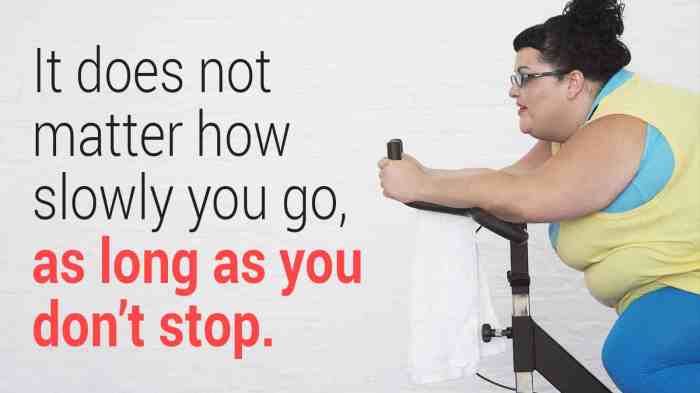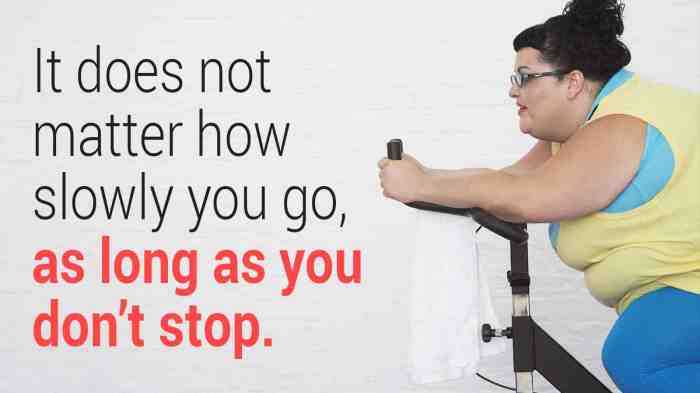Kicking off with Weight Loss Motivation, this opening paragraph is designed to captivate and engage the readers, setting the tone for a hip and relatable discussion on staying motivated to reach your weight loss goals. Whether you’re looking to shed a few pounds or embark on a major transformation, finding the drive to keep going is key. Let’s dive into what keeps us going and how to overcome those inevitable bumps in the road.
Understanding Weight Loss Motivation

To understand weight loss motivation, we need to look at what drives individuals to make healthy lifestyle changes in order to achieve their weight loss goals. Motivation is the internal or external factors that push someone towards a specific goal, in this case, losing weight.
Examples of Weight Loss Motivation
- Desire to improve overall health and well-being
- Wanting to look and feel better physically
- Health concerns or medical conditions that require weight loss
- Upcoming events like weddings or vacations
- Inspiration from others who have successfully lost weight
Importance of Motivation in Weight Loss
Motivation plays a crucial role in achieving weight loss goals because it provides the drive and determination needed to make lasting lifestyle changes. Without motivation, it can be challenging to stay on track with healthy eating habits and regular exercise routines. Setting specific goals and staying motivated can help individuals overcome obstacles and stay focused on their weight loss journey.
Internal vs. External Motivation
Internal motivation refers to the drive that comes from within oneself, such as personal goals, values, and desires. On the other hand, external motivation stems from outside influences like rewards, peer pressure, or societal expectations.
Internal Motivation
Internal motivators for weight loss can include a desire to improve one’s health, boost self-confidence, or increase energy levels. Setting personal goals like fitting into a certain clothing size or being able to participate in physical activities can also serve as internal motivation.
- Seeking better health outcomes
- Enhancing self-esteem and body image
- Setting personal goals for fitness
External Motivation, Weight Loss Motivation
External motivators for weight loss may involve rewards like money, praise from others, or avoiding negative consequences. Social support from friends and family, participation in weight loss competitions, or following a structured diet plan can provide external motivation.
- Participating in weight loss challenges
- Receiving rewards for reaching weight loss milestones
- Following a prescribed diet or exercise program
Comparing Effectiveness
While external motivation can provide initial momentum and accountability, internal motivation tends to be more sustainable in the long run. When individuals are intrinsically motivated by personal reasons and values, they are more likely to stick to their weight loss efforts even when faced with challenges. External motivators may lose their appeal over time, leading to fluctuations in commitment.
Internal motivation serves as the driving force behind lasting behavior change.
Strategies to Boost Motivation
To stay motivated during weight loss journeys, individuals can implement various strategies that help them stay focused on their goals and track their progress effectively.
Goal Setting
Setting clear and achievable goals is crucial for maintaining motivation during weight loss. By establishing specific targets such as losing a certain amount of weight within a defined timeframe or fitting into a specific clothing size, individuals can create a roadmap to success. These goals provide a sense of direction and purpose, motivating individuals to stay committed to their weight loss journey.
Tracking Progress
Tracking progress is a powerful motivational tool that allows individuals to see their hard work paying off. By keeping a record of their weight, measurements, food intake, and exercise routines, individuals can visually see the changes happening in their bodies. This progress tracking reinforces their commitment to healthy habits and boosts their confidence in achieving their weight loss goals.
Positive Reinforcement
Positive reinforcement involves rewarding oneself for achieving milestones or sticking to healthy habits. Rewards can be non-food related, such as buying new workout clothes, getting a massage, or enjoying a relaxing day off. By celebrating small victories along the way, individuals can stay motivated and focused on their weight loss journey.
Support System
Having a strong support system can significantly boost motivation during weight loss. Surrounding oneself with family, friends, or a community of like-minded individuals who encourage and cheer them on can provide the necessary motivation and accountability. Sharing successes, struggles, and progress with others creates a sense of camaraderie and support, keeping individuals motivated to reach their weight loss goals.
Overcoming Challenges and Setbacks

When it comes to weight loss, challenges and setbacks are inevitable. However, it’s important to have strategies in place to overcome these obstacles and stay motivated on your journey to a healthier lifestyle.
Identifying Common Challenges
- Plateaus: Many people experience weight loss plateaus where progress stalls, leading to frustration and loss of motivation.
- Social Pressure: Peer influence, societal norms, and social events can make it challenging to stick to a healthy eating and exercise routine.
- Emotional Eating: Stress, boredom, and other emotions can trigger overeating, making it difficult to stay on track with weight loss goals.
Tips for Overcoming Setbacks
- Reassess Your Goals: Take a step back and evaluate your goals, making any necessary adjustments to ensure they are realistic and achievable.
- Seek Support: Surround yourself with a strong support system of friends, family, or a weight loss group to help you stay motivated during tough times.
- Practice Self-Compassion: Be kind to yourself and understand that setbacks are a normal part of the process. Learn from them and move forward.
Success Stories
- Meet Sarah, who faced multiple plateaus during her weight loss journey. Instead of giving up, she adjusted her workout routine and sought advice from a fitness coach. With perseverance, she was able to break through the plateaus and reach her goal weight.
- John struggled with emotional eating but found solace in journaling his feelings and seeking therapy. By addressing the root cause of his emotional eating, he was able to develop healthier coping mechanisms and stay on track with his weight loss goals.
